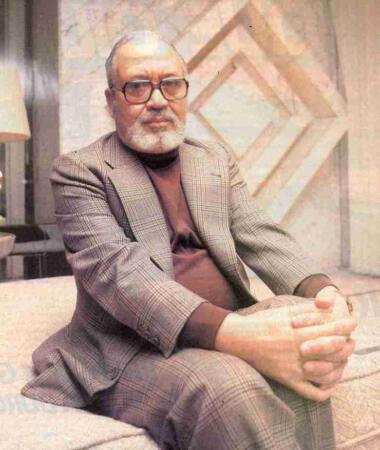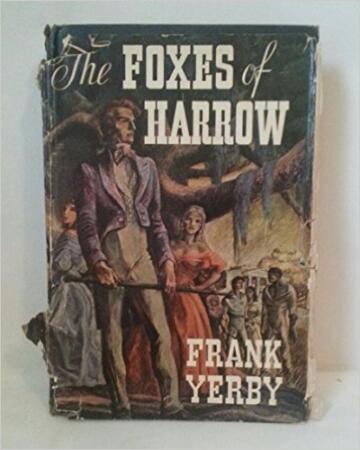
No, Oscar Micheaux wasn’t the first, because I’m only considering books that have been optioned and adapted by Hollywood studios; not independently-financed projects.
Searching for an answer to the question of what the first book adapted by a Hollywood studio was, I went through a few books of my own that cover black film history, notably works by Donald Bogle, bell hooks, Manthia Diawara, Ed Guerrero, and others. And I think I found the answer within the pages of Guerrero’s “Framing Blackness: The African American Image In Film” (a recommended read if you haven’t read it already).
On page 28, in the chapter titled “Hollywood’s Inscription of Slavery,” Guerrero mentions a 1946 book by African American author, Frank Yerby, titled, “The Foxes of Harrow.”
Guerrero doesn’t explicitly state that the book is indeed the first by a black author to be adapted by a Hollywood studio (20th Century Fox in this case), so I wasn’t immediately certain. Naturally, I looked up Yerby and the book, to find mentions on a number of sites (Wikipedia, IMDB, The New Georgian Encyclopedia, and others) that all say Yerby was the first African American author to see his work adapted to film by a Hollywood studio.
 I dug a little further looking for any information that would challenge this, but, thus far, no luck. So I’m going to continue to run with the claim that Frank Yerby’s “The Foxes of Harrow” was the first book by a black author to be adapted to film by a Hollywood studio.
I dug a little further looking for any information that would challenge this, but, thus far, no luck. So I’m going to continue to run with the claim that Frank Yerby’s “The Foxes of Harrow” was the first book by a black author to be adapted to film by a Hollywood studio.
So what’s this book about?
Well, first, it’s worth noting that it was a best-seller; it centered on “an Irish rascal and inveterate gambler who wins a vast estate while gaming in New Orleans.”
In 1947 John M. Stahl directed a film based on the book, which starred Rex Harrison and Maureen O’Hara. It was nominated for an Academy Award for Best Art Direction.
The novel the film is based on appears to be out of print, although you can buy early editions from resellers via Amazon.com, as I learned.
As for the film, it wasn’t readily available for years; I recall Amazon had a Spanish version, in region 2.
Finally, as I recently learned, 20th Century Fox released several never-before-released on home video titles from the Fox Cinema Archives, that the studio made available on DVD for the first time ever.
And one of the titles listed is “The Foxes Of Harrow” (1947, 118 Minutes). So you can now buy an official copy at several retailers, including Amazon.
Clearly, the book’s story isn’t centered on black people, which would partly explain studio interest at the time. As for its content… in Ed Guerrero’s book, he praises the film (not necessarily Yerby’s book), as one of a number of 1940s movies that “increasingly sensitized Hollywood to the African American perspective on slavery…” He highlights 2 scenes from the film as examples of an “undercurrent of… cultural resistance to slavery and Christianity.”
In the first, slaves are shown practicing a voodoo ceremony; and in the second, a black mother throws herself and her baby into a river to avoid having to go on living in slavery (almost as if addressing the scene from “Birth of a Nation,” when the white woman jumps off a cliff to avoid submitting to a black man).
So clearly, there were subplots involving black people. But, as I said, that was the movie adaptation, not the book.
With regards to the book, I found this piece in the New Georgian Encyclopedia: “Yerby was often criticized by blacks for the lack of focus on, or stereotypical treatment of African American characters in his books. Thus, ironically, while Yerby held the distinction of being the first best-selling black novelist, he also became one of the most disparaged for his lack of racial consciousness.”
In response to this criticism, Yerby argued that “the novelist hasn’t any right to inflict on the public his private ideas on politics, race, or religion.” As my research tells me, he later amended this stance to a degree, and in the late 1950s and 1960s, he wrote novels that touched upon issues of race and racism.
This is a conversation that black artists and black audiences and critics continue to have today – specifically, whether a black artist is in any way obligated to tell stories that tackle issues of importance to the black community, or whether their work should be message-driven, demonstrate “racial consciousness,” etc, or whether black creatives should be free to create whatever they want to, whether it’s a nonsensical comedy, or action film, with no specific agenda other than to entertain, or a more *serious* film with a definite message or call to action; and everything else between (or beyond).
Yerby died in 1991 by the way. He was 75 years old. The above photo of him was taken in 1983.
Reminded of this, I purchased a copy of the film; you can do the same here or click on the DVD cover below.

